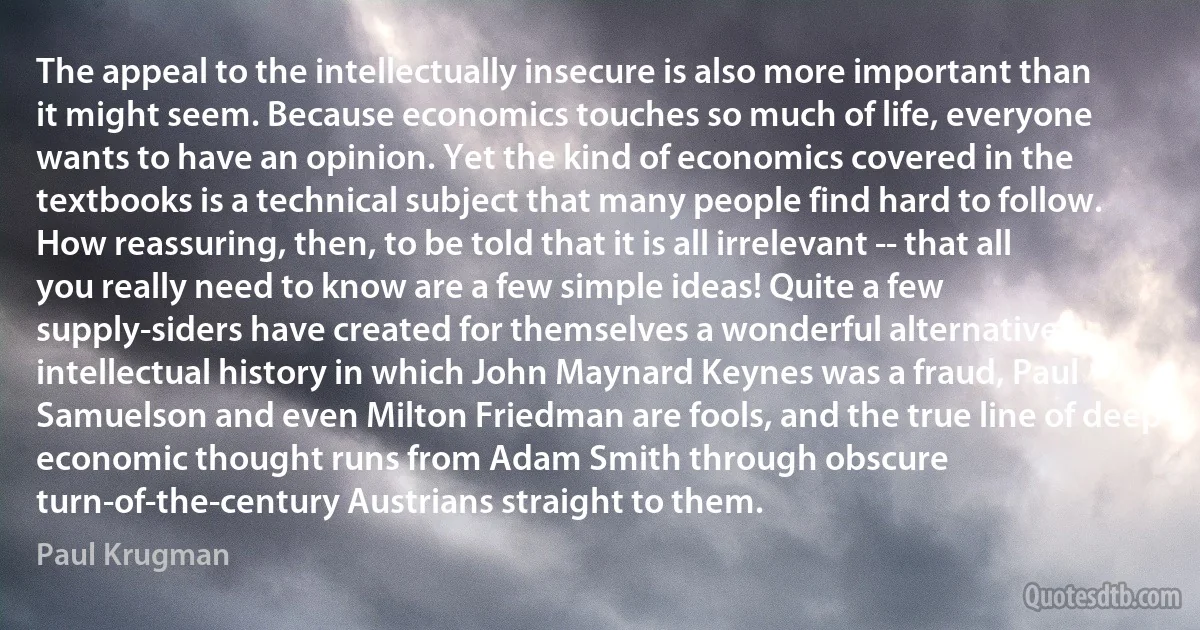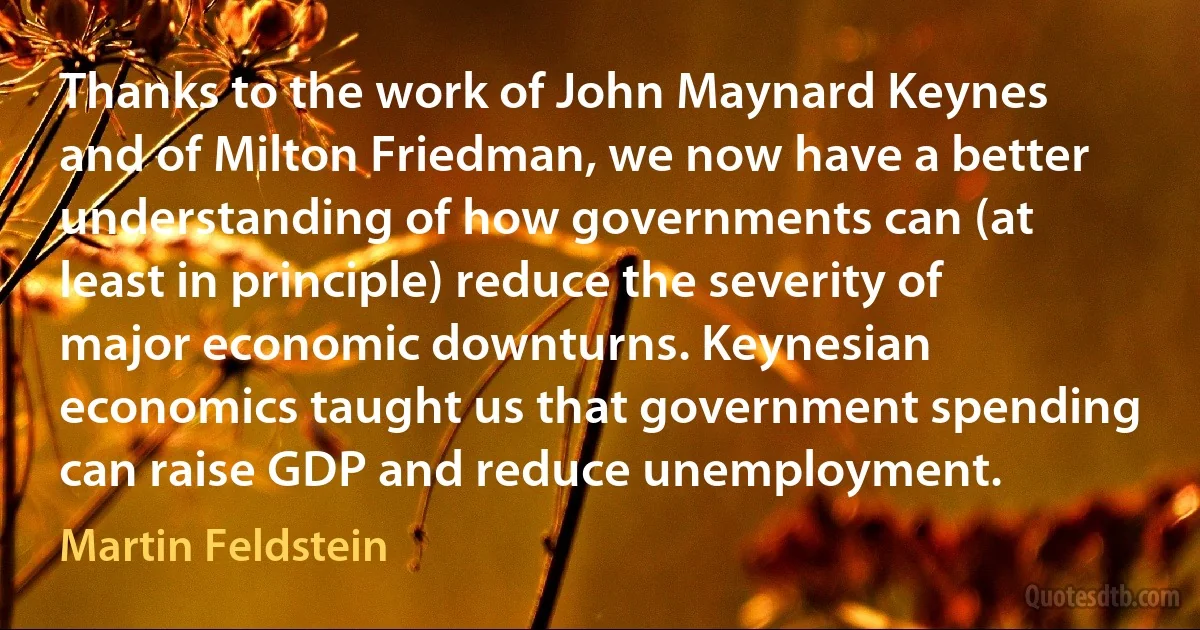Friedman Quotes
The flat tax I got on my first meeting with Margaret Thatcher, who I admired very much and who was a great admirer of Milton Friedman. I met her first when I had been prime minister I think for some months and so on, and when I told her what I am planning to do, she looked at me with these big eyes and said "you are one brave young man.” And then a little bit introduced me on the realities of the Western world on which I was not very well informed. But I didn't stop.

Mart Laar
The proof of the pudding is in the eating. There was a widespread myth of the 1970s, a myth along Tom Kuhn's (1962) Structure of Scientific Revolutions lines. The Keynesianism, which worked so well in Camelot and brought forth a long epoch of price-level stability with good Q growth and nearly full employment, gave way to a new and quite different macro view after 1966. A new paradigm, monistic monetarism, so the tale narrates, gave a better fit. And therefore King Keynes lost self esteem and public esteem. The King is dead. Long live King Milton!
Contemplate the true facts. Examine 10 prominent best forecasting models 1950 to 1980: Wharton, Townsend–Greenspan, Michigan Model, St. Louis Reserve Bank, Citibank Economic Department under Walter Wriston's choice of Lief Olson, et cetera. ... M did matter as for almost everyone. But never did M alone matter systemically, as post-1950 Friedman monetarism professed.

Paul Samuelson
When I once called myself a "Sunday painter” dabbling in stochastic finance, that was not meant to belittle finance theory as a branch of serious economic theory. Such a peculiar view was expressed again and again by the late Milton Friedman, a dizzy view that I still find incomprehensible.

Paul Samuelson
If the existence of bullshit jobs seems to defy the logic of capitalism, one possible reason for their proliferation might be that the existing system isn't capitalism-or at least, isn't any sort of capitalism that would be recognizable from the works of Adam Smith, Karl Marx, or, for that matter, Ludwig von Mises or Milton Friedman.

David Graeber
Economists, like everyone, have their political biases, but these are by no means as strong an influence on what they are willing to consider as you might think. For example, one might have thought that strongly liberal economists like, say, James Tobin would be at least mildly sympathetic to the views of radical economists who draw their inspiration from Marx, or of heterodox economic thinkers like Galbraith. After all, in such fields as history and sociology the Marxist or post-Marxist left has long received a respectful hearing. And yet you don't find this happening: liberal economists are almost as quick as their conservative colleagues to condemn heterodox leftist ideas as foolish it was the liberal Robert Solow, not Milton Friedman, who defended orthodoxy in the bitter "capital controversy" with British radicals.

Paul Krugman
The kind of economic trouble that Asia experienced a decade ago, and that we're all experiencing now, is precisely the sort of thing we thought we had learned to prevent. In the bad old days big, advanced economies with stable governments-like Britain in the 1920s-might have had no answer to prolonged periods of stagnation and deflation; but between John Maynard Keynes and Milton Friedman, we thought we knew enough to keep that from happening again.

Paul Krugman
One interesting footnote: although Friedman made great strides in macroeconomics by applying the concept of individual rationality, he also knew where to stop. In the 1970s, some economists pushed Friedman's analysis of inflation even further, arguing that there is no usable trade-off between inflation and unemployment even in the short run, because people will anticipate government actions and build that anticipation, as well as past experience, into their price-setting and wage-bargaining. This doctrine, known as "rational expectations,” swept through much of academic economics. But Friedman never went there.

Paul Krugman
It's a tribute to the importance of Friedman's work that questions about his legacy bear so directly on contemporary policy issues. But for that reason it's also important not to engage in hagiography. Friedman was a great economist, but like every other great economist in history, he was also wrong about some important things.

Paul Krugman
If Keynes was Luther, Friedman was Ignatius of Loyola, founder of the Jesuits. And like the Jesuits, Friedman's followers have acted as a sort of disciplined army of the faithful, spearheading a broad, but incomplete, rollback of Keynesian heresy. By the century's end, classical economics had regained much though by no means all of its former dominion, and Friedman deserves much of the credit.

Paul Krugman
Keynes didn't make an all-out assault on Economic Man, but he often resorted to plausible psychological theorizing rather than careful analysis of what a rational decision-maker would do. Business decisions were driven by "animal spirits,” consumer decisions by a psychological tendency to spend some but not all of any increase in income, wage settlements by a sense of fairness, and so on.
But was it really a good idea to diminish the role of Economic Man that much? No, said Friedman, who argued in his 1953 essay "The Methodology of Positive Economics” that economic theories should be judged not by their psychological realism but by their ability to predict behavior. And Friedman's two greatest triumphs as an economic theorist came from applying the hypothesis of rational behavior to questions other economists had thought beyond its reach.

Paul Krugman
Keynesian theory initially prevailed because it did a far better job than classical orthodoxy of making sense of the world around us, and Friedman's critique of Keynes became so influential largely because he correctly identified Keynesianism's weak points. And just to be clear: although this essay argues that Friedman was wrong on some issues, and sometimes seemed less than honest with his readers, I regard him as a great economist and a great man.

Paul Krugman
I don't like criticizing Milton Friedman not only because he is an old friend but because, outside of monetary theory, we are in complete agreement. Our general views on what is desired and what is not are almost identical until we get on to money. But if I told him what I said before, that I very much doubt whether monetary policy has ever done anything good, he would disagree. He personally is convinced that a good monetary policy is a foundation for everything.

Friedrich Hayek
There is no doubt, and in this I agree with Milton Friedman, that once the Crash had occurred, the Federal Reserve System pursued a silly deflationary policy. I am not only against inflation but I am also against deflation! So, once again, a badly programmed monetary policy prolonged the depression! So, once again, a badly programmed monetary policy prolonged the depression. One consequence of this policy was, of course, the fact that confidence was destroyed.

Friedrich Hayek
I don't know what monetarism is. If monetarism just means a good old-fashioned quantity theory, of course it has not failed. If it means the particular version of Milton Friedman, I think it has because he imagines that he can achieve - ascertain - a clear quantity relationship between a measurable quantity of money and the price level. I don't think that is possible. In fact, just about 40 years ago in the opening sentences of my book, Prices and Production, I wrote that it would be a great misfortune if people ever cease to believe in the quantity theory of money. It would be even worse ever to believe it literally. And that's exactly what Milton Friedman does.

Friedrich Hayek
[ Milton Friedman was] the dominant member of the so-called Chicago school of economics [during his tenure at Chicago]... The economics department increasingly reflected his approach and interests. These included deep commitment to the truth, appreciation of markets and free enterprise, frank and blunt discussion, and enormous zeal to convince the heathen. But most important was the commitment to economic analysis as a powerful instrument for interpreting economic and social life.

Gary Becker
I heard Edwin Fischer, who did not mean much to me. I heard another pianist in Berlin who had a big success and I thought he was awful - Mischa Levitzki. Just fingers, and you cannot listen only to fingers. There is a difference between artist and artisan. Levitzki was an artisan. But Ignaz Friedman, who I admired, was a great artist. He had wonderful fingers and a very personal, individual way of playing, even if some of his ideas were very strange to me. He had no hesitation touching up the music. I got annoyed with him at one concert when he changed the basses in Chopin's F minor Ballade. I didn't like that. For some reason he was happier making records than he was on the stage.

Vladimir Horowitz
Monetarism-both of the older Friedman version stressing adherence to money stock targets and of the newer rational expectations variety-has been badly discredited. The stage has been set for recovery in the popularity of Keynesian diagnoses and remedies. I do not mean to imply, of course, that there is some Keynesian truth, vintage 1936 or 1961, to which economists and policymakers will or should now return, ignoring the lessons of economic events and of developments in economics itself over these last turbulent fifteen years. I do mean that in the new intellectual synthesis which I hope and expect will emerge to replace the divisive controversies and chaotic debates on macroeconomic policies, Keynesian ideas will have a prominent place.

James Tobin
Economic history has contributed significantly to the formulation of economic theory. Among the economists who have found history an important source for their ideas are Smith, Malthus, Marx, Marshall, Keynes, Hicks, Arrow, Friedman, Solow, and Becker. Failure to take account of history, as Simon Kuznets (1941) stressed, has often led to a misunderstanding of current economic problems by investigators who have not realized that their generalizations rested upon transient circumstances. Nowhere is the need to recognize the role of long-run dynamics more relevant than in such pressing current issues as medical care, pension policies, and development policies.

Robert Fogel



